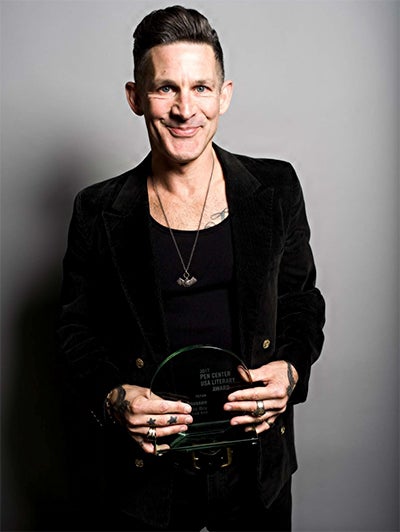Submitted by Shira Brown

Professor Martin Pousson with his PEN Center USA 2017 Literary Award for Fiction
It’s not every day that the dean of your college calls you up and invites you out on a Friday night. But when she does, ya’ gotta say yes! Little did I know that on this particular Friday night in October, not only was I going to take a selfie with one of my literary she-roes, but I was also going to learn, laugh, and be inspired.
The PEN Center USA held its 27th Annual Literary Awards Festival at the Beverly Wilshire Hotel on October 27, 2017, and our very own English professor Martin Pousson was awarded the Fiction award for his novel Black Sheep Boy. And he was in great company! That same night Janet Mock received the Award of Honor, and Margaret Atwood received the Lifetime Achievement Award. The evening was filled with standard gala fare—open bar, chicken and green beans, and the chatter of strangers trying to connect. But beyond the predictable was a layer of inspiration, an atmosphere of truth and justice and transformation.
I’m embarrassed to say that going in I knew little about PEN Center USA. Beyond its mission to encourage and preserve interest in the written word, I dis-covered that it is a branch of PEN International, the world’s leading international literary and human rights organization. Moreover, “PEN Center USA advocates for imprisoned, censored, and persecuted writers throughout the world.” Learning this reality changed the entire affair for me. I was no longer at yet another award ceremony, but I was in the company of activists and truth-tellers. This could not be more timely, as it seems to be open season on responsible journal-ism, threats to net neutrality, and the contentious discourse surrounding the First Amendment.
So, while on the surface this evening was about honoring great poetry, fiction, journalism, research nonfiction, etc., it was ultimately about a revolution—the revolutionary act of writing. Each honoree spoke of taking risks and freedom and power. They spoke of storytelling as a radical act, whether it is fictional or not. They lamented over concerns for freedom of speech and the consequences of silence. Janet Mock claimed, “the act of writing your story is revolutionary.” Martin Pousson declared, “Who controls language controls speech. Who controls speech controls silence.” And Solmaz Sharif proclaimed, “The first casualty of war is language.” There was no end to the gratitude these authors expressed. Yet, simultaneously, a shared fear stood as a rallying cry for all the artists and activists in the room. We cannot allow hate and injustice to eclipse truth, and we cannot settle for anything less. The moment we accept censorship as our reality is the moment we give our power away.
PEN Center USA understands that freedom to write is freedom to live, and the act of awarding writers isn’t about judging great versus mediocre writing; rather, it is about honoring the courage to write and speak your truth. I cannot say it any better than my colleague Martin Pousson: “We are the words we say, and we are the stories we tell. If we don’t say the words or tell the story, then someone else will say and tell in our name, and someone else will claim author-ship and authority over our lives.”
